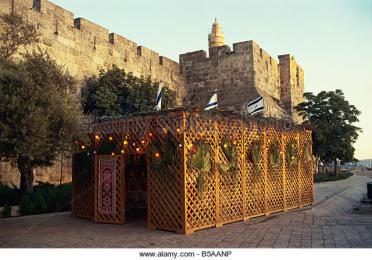Every week, parshaoftheweek.com brings you a rich selection of material on parshat hashavua, the weekly portion traditionally read in synagogues all over the world. Using both classic and contemporary material, we take a look at these portions in a fresh way, relating them to both ancient Jewish concerns as well as cutting-edge modern issues and topics. We also bring you material on the Jewish holidays, as well as insights into life cycle rituals and events...
In Jewish trivia games – of a certain type – there is a well-known question: what Mitzvot (commandments) can be done by just being somewhere? Without doing anything in particular, just being in a particular place. The well-known answers are:
- Sitting in a Sukkah
- Immersing oneself in a Mikveh (ritual bath – you just have to be in the water)
- Living in the land of Israel (if it is, indeed one of the Torah’s commandments - there is a discussion about that). A subset of this last one is making the pilgrimage on the Festivals – one is commanded by the Torah to simply be in Jerusalem, in the vicinity of the Temple, on the Pilgrimage Holidays.
Clearly, these commandments tell us that there are special places, as well as special times, when we are called upon to be present. One enters the waters of the Mikveh to place oneself in a foreign, strange element, in order to effect a change, a transformation. One dwells in the Sukkah for a week for the same reason - to be in a different, suggestive place, with implications, messages, and memories of its own, which are meant to take us out of our normal mental and spiritual territory, place us in a new one, and thereby, hopefully, create an experience, a learning moment, an emotional moment, which will change us in some way.
The same is meant to be true about Israel, and Jerusalem. Simply being in places with such a heavy weight of history, of memory, of hope and longing, victory and defeat, redolent with the past, present and future of one’s people, should have an effect, should make a difference, in the ways we think and behave.
I’d like to wish us all here in Israel a Sukkot holiday in which we remember that just as being in the Sukkah is meant to be an experience that does something to us, so is being in Israel. The closeness to Jewish history and memory, Jewish values, and the Jewish people’s covenantal relationship with God, which we hope to feel when we leave our homes and enter the Sukkah, should be something we feel every day, in Jerusalem, and in Israel, the place of so much Jewish memory, Jewish history. Too often, here in Israel, we seem to forget where we are, and I hope we can be more mindful, more present, more connected, and do better.
For all of us, in Israel or the Diaspora, I wish for an understanding of the importance that simply being present can have. Being consciously and purposefully present when we are with our families and loved ones, our friends, people in need or distress, or people we just happen to meet. “Just being there” can be a Mitzvah, as the answers to the trivia question shows us. Let’s all try to find more opportunities to turn “just being there” into a Mitzvah.
חג שמח
Shimon



Get inspired by Sukkot Divrei Torah from previous years